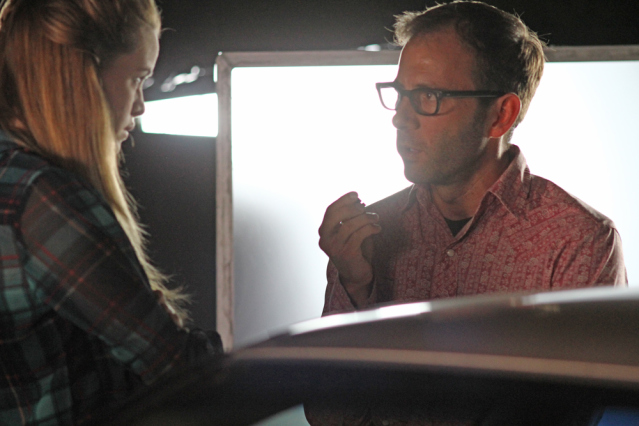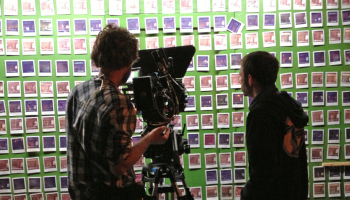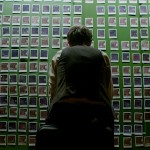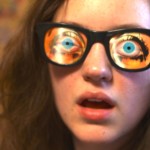By David Pountain
Slated for release in US cinemas this coming May, Time Lapse, the mind-bending directorial feature-length debut of Bradley King, has generated quite a buzz on the festival circuit. Following three roommates who discover a camera that regularly prints out pictures from 24 hours into the future, this dizzying sci-fi thriller has already won more than a handful of awards both in the US and internationally – and with its formation of psychologically-driven suspense grounded in playfully complex ideas, Time Lapse seems to have the broad appeal to considerably expand its audience over the coming months. I was fortunate to get into contact with director Bradley King, who took me through the process behind his unique creation.
Raised in Los Alamos, New Mexico, Bradley studied animation at the Colorado Institute of Art before attending the Colorado Film School. Since moving to Los Angeles, he has been involved in several short films, including the festival-winning comedy Action Figures. When asked about his creative influences, Bradley said that he had closely studied the films of Hitchcock, Kubrick, Kurosawa and the Coen Brothers. “I’m a big fan of macabre humour mixed with genuinely emotional and dire stakes, so any filmmaker or novelist that successfully pulls off that balance catches my attention.”

The idea for Bradley’s latest work arose during a brainstorm with his neighbour and co-writer BP Cooper. “Cooper said, “What about a camera that’s a time machine?”. He was riffing off of something he’d seen in the movie Timelines, which has a camera that gets sent back in time. Once he made the leap to a camera actually being combined with the time machine in the same device, then my imagination started going as well and we pretty quickly hatched the story from there.”
Drawing inspiration from Hitchcock’s Rear Window, the plot was further shaped by the need to shoot on one location. “We set that for ourselves as a financial and practical necessity. Then those limitations of the location and the nature of the machine actually made it easier to write, in my opinion. It gave us hard boundaries to bounce off of.” Bradley cites Shallow Grave and A Simple Plan as two more points of reference, saying that he and Cooper “made a point of studying stories that involved a group of friends discovering something valuable that ends up straining their relationship.”

The resultant product, Time Lapse, is a film that thrives on the complications produced by its premise. Bradley described the process of planning out the film’s intricacies as “difficult but fun. The photo popping out each day gave us something to aim for; it was like candy, even during the writing process, we were excited to see what was going to show up next in the Polaroids. The trickiest part was definitely making sure that, at the end, all of the time logic was working and that everything had tumbled in a way that didn’t have any holes. We had a lot of yarn on the wall going from which photo was taken when, to when it was discovered, etc. All that translated into a lot of continuity energy on the set – we were always having to double check which clothes were going with what painting in the background on which day.”
Bradley seems cautiously optimistic about the future of science fiction cinema. When asked whether he believes that audiences today are more open than they used to be to elaborately structured works in the genre, his response was enthusiastic. “I do! With caveats. I think in terms of genre accessibility, horror is probably always going to remain king. However, it’s nice to see science fiction is starting to get more mainstream and digestible by society in general. If you look at the history of cinema, it’s arguable that for a large portion of it, sci-fi content was considered mainly for geeks or weirdos. Unless it crossed over into horror, it just didn’t have that much traction. As a result, it wasn’t very profitable or reasonable for a creative person to make a career out of it. Now, for whatever reason it does seem that more “˜hard’ science fiction is starting to resonate with people, and I think that’s awesome. I want to be moved emotionally in movies, but I also want to think, and I actually am (probably naí¯vely) hopeful that an upswing in interest in more elaborately structured sci-fi means that perhaps humanity as a whole is actually getting slightly smarter.”
As for Bradley’s own future, he currently has three projects in development. “They’re all science fiction, and I think if someone enjoyed Time Lapse they’ll like what we have coming next.”
Watch Time Lapse now on FilmDoo (UK & Ireland only)






4 thoughts on “INTERVIEW: FILMDOO GOES BACK IN TIME WITH DIRECTOR BRADLEY KING”